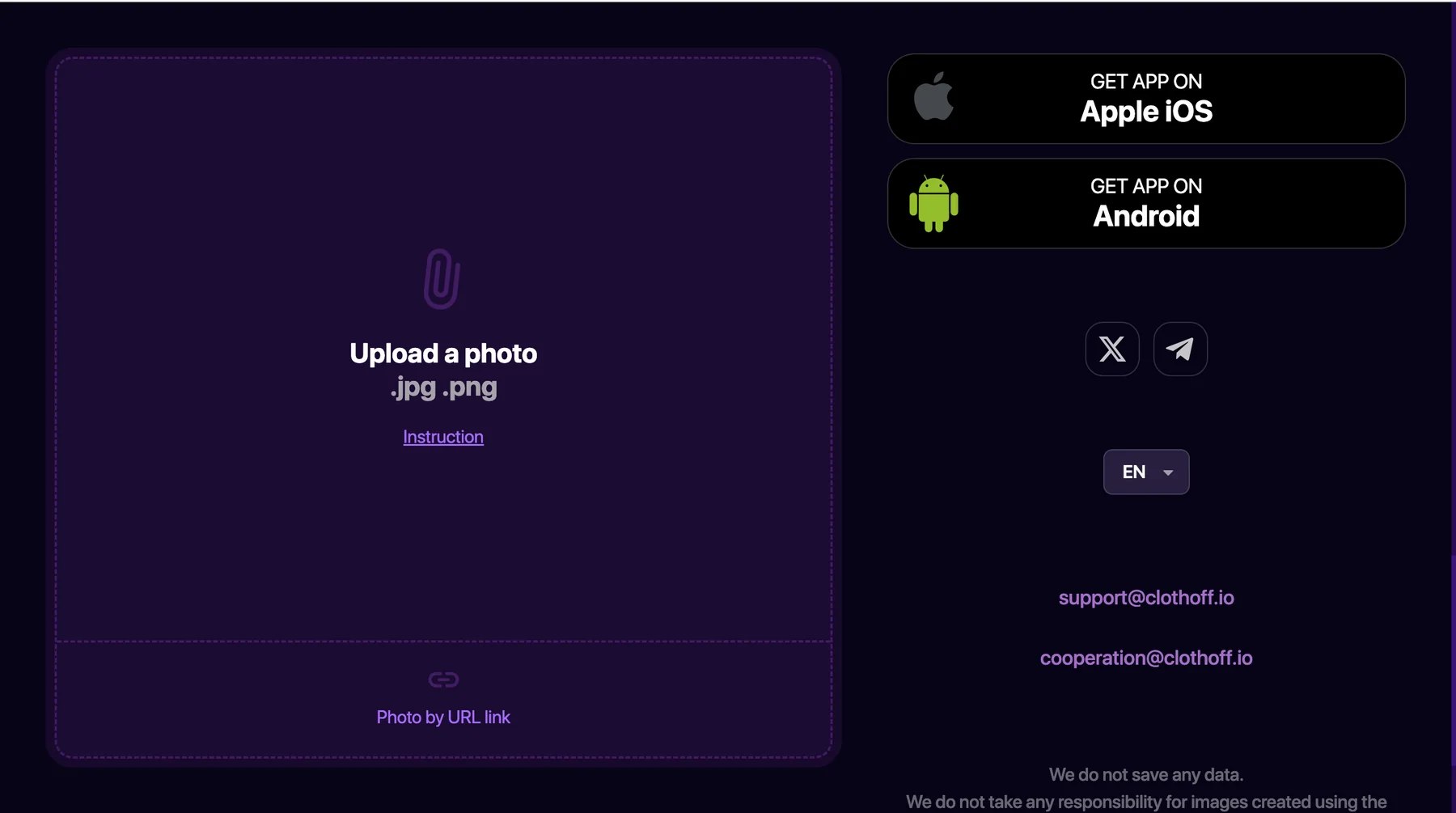Have you heard of clothoff.io? If not, you're not alone—but the app has already made waves online, drawing millions of monthly visitors and sparking some serious conversations. At first glance, it seems like just another AI-powered image generator, but there’s a lot more going on beneath the surface. From its mysterious creators to the ethical questions it raises, clothoff.io is a topic worth exploring.
If you’re curious about what clothoff.io does, how it works, or why it’s generating so much buzz, you're in the right place. This article dives deep into what makes the app so controversial, how users are engaging with it, and what the future might hold for AI-generated content platforms like this one.
So whether you're a tech enthusiast, a privacy advocate, or just someone who loves staying informed about the latest digital trends, this post will give you a clear picture of clothoff.io and why it matters in today’s online world.
Table of Contents
- What Is Clothoff.io?
- How Does Clothoff.io Work?
- Why Is Clothoff.io Controversial?
- User Experience and Community Engagement
- Alternatives to Clothoff.io
- Frequently Asked Questions
- Final Thoughts and What’s Next
What Is Clothoff.io?
Clothoff.io is an AI-powered image editing platform that gained attention for its ability to generate modified images, including some that simulate removing clothing from photos. The site reportedly receives more than 4 million monthly visits, which shows just how popular—and polarizing—this kind of technology has become.
While the exact creators remain somewhat anonymous, some financial transactions have led to a company registered in London called Texture Oasis. This secrecy around ownership has raised eyebrows, especially as the app continues to grow in popularity and functionality.
The app is part of a broader trend of AI tools that allow users to manipulate images with just a few clicks, but clothoff.io stands out for the nature of its core feature and the ethical questions it brings up.
How Does Clothoff.io Work?
The interface of clothoff.io is reportedly simple and user-friendly, letting people upload images and apply AI-generated effects. The process is fast, and users don’t need any special technical skills to use the app. It’s designed to be accessible, which is both a strength and a concern, depending on how the tool is used.
Behind the scenes, the app uses artificial intelligence models trained on large image datasets to simulate realistic transformations. These AI systems have become increasingly sophisticated, making the results more convincing and harder to detect.
Some users share their modified images on online communities like Reddit or Telegram groups, where they can find feedback or even swap referrals. One such community, clothoff18, has grown steadily, though it's smaller compared to other AI-focused groups online.
Why Is Clothoff.io Controversial?
The main issue with clothoff.io revolves around consent and misuse. Because the app can generate images that make it look like someone is undressed, it raises serious concerns about how such technology can be exploited. Without clear safeguards or permissions, there’s a real risk of misuse, including deepfake pornography or harassment.
These ethical dilemmas aren’t unique to clothoff.io, but the app has drawn particular attention because of the nature of its primary function. Some compare it to other AI tools like Muah AI, which focuses on photo generation but claims to be free and faster. However, the use case and potential for harm are quite different.
The creators of clothoff.io have taken steps to keep their identities hidden, which only adds to the controversy. Payments linked to the app have led to Texture Oasis, a London-based company, but beyond that, not much is publicly known about the people running the operation.
User Experience and Community Engagement
Despite the controversy, clothoff.io has a growing user base. Some people enjoy the creative possibilities it offers, while others are drawn to the shock factor or simply curious about what AI can do. Online forums like Reddit and Telegram host discussions about the app, with some users sharing results and others debating its implications.
For example, on Reddit, there are communities like r/TelegramBots that have over 37,000 members, where people share and discuss bot tools—including ones related to image manipulation. Similarly, the clothoff18 subreddit, though smaller, gives users a space to post their creations and interact with others.
One of the interesting aspects of clothoff.io’s community is how users trade referrals and promote the app. Some groups, like r/ReferralSwaps, encourage people to share referral links and help each other get better access or benefits. However, these communities often remind users not to upvote posts just to boost visibility, keeping things fair and transparent.
Alternatives to Clothoff.io
If you're looking for similar tools but want to explore other options, there are several AI-based image editing apps out there. One example is Muah AI, which, as mentioned earlier, focuses on fast, free image generation. Unlike clothoff.io, it doesn’t center on undressing images, which makes it more acceptable for general use.
Other platforms like Character.ai or AI chatbots offer different kinds of AI-generated content, such as conversational agents or personalized avatars. These tools are part of a broader AI movement that’s reshaping how we interact with technology, though they come with their own set of ethical questions.
When choosing an AI image tool, it’s important to consider not just what it does but also how it aligns with your personal values and ethical boundaries. Not all AI tools are created equal, and what works for one person might not be right for another.
Frequently Asked Questions
Is clothoff.io safe to use?
While the app itself doesn’t pose a direct threat to your device, the ethical concerns around its use are significant. Users should be aware of how their actions may affect others, especially when generating images without consent.
Can clothoff.io be used for good?
Like any technology, clothoff.io can be used in both positive and negative ways. Some users may find creative applications, but the risk of misuse is high, especially when it comes to non-consensual image generation.
Are there legal consequences for using clothoff.io?
Depending on how the app is used, there could be legal implications, especially if images are created without consent or shared in a harmful way. Laws around deepfakes and digital consent vary by country, so it’s important to understand the rules in your area.
Final Thoughts and What’s Next
Clothoff.io is more than just another AI image generator. It’s a reflection of where we’re heading as a society when it comes to digital ethics, privacy, and the power of artificial intelligence. While the app itself is fast and easy to use, the consequences of its use are far-reaching and complex.
As AI continues to evolve, so too must our understanding of how to use it responsibly. Whether you're a user, a developer, or just an observer, it's important to stay informed about what tools like clothoff.io can do—and what they shouldn’t be used for.
For more information on AI tools and their impact on privacy and security, Learn more about AI ethics on our site. And if you're interested in how technology shapes our digital world, be sure to check out our full guide on AI image generation and user responsibility.



